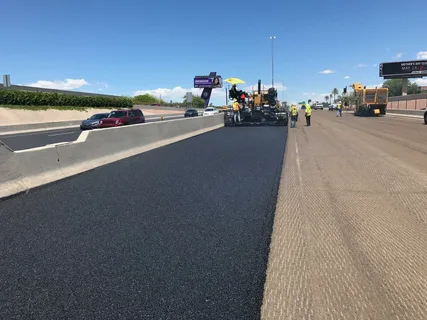When it comes to maintaining roads, parking lots, or driveways, one crucial step in the process is asphalt milling. If you’re managing a commercial property, municipal road, or any asphalt surface, understanding professional asphalt milling services can save you time, money, and future headaches.
What is Asphalt Milling?
Asphalt milling, also known as cold planing or pavement profiling, is the process of removing the top layer of asphalt pavement. This is done using specialized milling machines equipped with rotating drums and carbide teeth that grind the surface without damaging the underlying base. The removed asphalt is then collected and recycled for reuse in new pavement, making it an eco-friendly method.
Why Choose Professional Asphalt Milling?
While it might seem tempting to do repairs without milling or with cheaper methods, professional milling offers many advantages:
- Precision and Quality: Experts use advanced equipment calibrated for exact depths, ensuring a smooth and uniform surface.
- Cost-Effectiveness: Milling reuses the old asphalt, reducing the need for new materials and cutting overall project costs.
- Environmental Benefits: Recycling asphalt reduces waste and lowers the carbon footprint of construction projects.
- Longevity: Proper milling helps prepare surfaces for new asphalt layers, improving adhesion and extending the pavement’s life.
Safety: Professional milling eliminates bumps, potholes, and uneven areas, reducing accident risks.
How Does Asphalt Milling Work?
- Inspection & Planning Before milling begins, experts inspect the pavement condition to determine the depth and areas needing removal. They plan the project based on traffic, weather, and surface conditions.
- Setup & Safety Measures The site is prepared with safety barriers and traffic control measures to protect workers and drivers.
- Milling Process the milling machine removes the specified thickness of asphalt layer by layer. Modern machines collect the milled material in a conveyor system, preventing debris scatter.
- Clean-Up & Recycling After milling, the ground surface is swept clean and ready for resurfacing. The reclaimed asphalt pavement (RAP) is transported to asphalt plants for processing.
Types of Asphalt Milling
- Full-Depth Milling: Removing the entire asphalt layer to repair severe damage.
- Partial Milling: Removing only a portion, usually the top layer, for resurfacing.
- Contour Milling: Milling specific areas to adjust the surface contour or slope.
- Spot Milling: Targeting small areas like potholes or localized damage.
When is Asphalt Milling Necessary?
- Surface Deterioration: When the pavement shows cracks, rutting, or potholes.
- Preparation for Resurfacing: Before laying a new asphalt layer, milling removes the old worn-out surface.
- Improving Drainage: Milling adjusts the slope to prevent water pooling.
- Leveling Uneven Pavements: To ensure smooth rideability and compliance with road standards.
Benefits of Professional Asphalt Milling Services
- Cost Savings
Recycling milled asphalt into new pavement materials reduces the amount of new asphalt needed, lowering costs significantly. - Time Efficiency
Professional crews with modern milling machines complete jobs quickly, minimizing downtime for roads or parking areas. - Enhanced Pavement Performance
Removing damaged layers improves the quality of the new asphalt overlay, resulting in better durability. - Reduced Environmental Impact
Using recycled asphalt conserves natural resources and reduces greenhouse gas emissions associated with producing new materials. - Improved Safety and Appearance
Milling eliminates tripping hazards, bumps, and cracks, making surfaces safer and visually appealing.
Choosing the Right Asphalt Milling Contractor
- Selecting a professional milling contractor is key to the project’s success. Consider these factors:
- Experience & Expertise: Look for companies with proven experience in similar projects.
- Equipment Quality: Modern, well-maintained machinery ensures precision and efficiency.
- Safety Record: Contractors should prioritize worker and public safety.
- Reputation & References: Check reviews and ask for past project examples.
- Compliance & Insurance: Ensure the contractor meets local regulations and holds proper insurance.
Asphalt Milling vs. Other Pavement Repair Methods
- Repair Method Advantages Disadvantages
- Asphalt Milling Precise, eco-friendly, cost-effective Requires specialized equipment
- Patching Quick, low cost for small repairs Temporary fix, not suitable for large areas
- Overlay Smooth finish, adds strength Adds thickness, may raise surface levels
- Full Replacement Complete repair, fixes deep damage High cost, longer project time
Asphalt milling offers the best balance of quality, sustainability, and cost savings compared to other methods.
Maintenance Tips After Milling and Resurfacing
- Regularly inspect the pavement for cracks or damage.
- Sealcoat the asphalt every few years to protect against weathering.
- Address drainage issues promptly.
Avoid heavy loads or standing water on new asphalt during curing.
Conclusion
Professional asphalt milling services are essential for maintaining durable, safe, and visually appealing asphalt surfaces. By removing worn-out layers and recycling materials, milling helps save costs, supports sustainability, and extends the life of pavements. Whether you manage a city road, commercial parking lot, or residential driveway, investing in professional asphalt milling is a smart choice for long-term pavement health. Always choose experienced contractors who use modern equipment and adhere to safety standards to get the best results.

